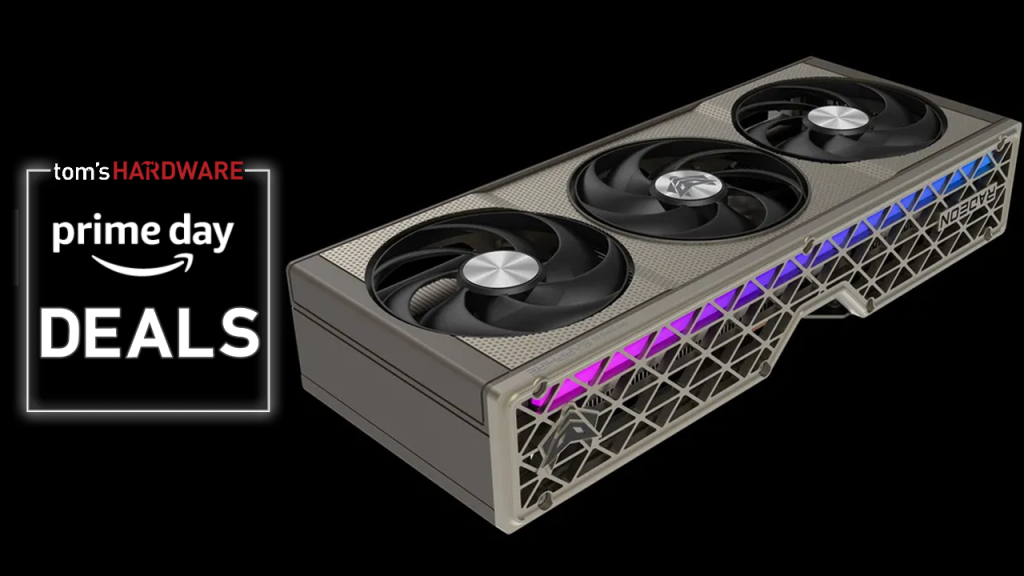As gamers continue to seek affordable yet powerful components for their PCs, the current landscape reveals some enticing deals on graphics cards, particularly during promotional events like Amazon Prime Day. For those aiming for competent 1080p gaming, two standout options have surfaced, both offering 8GB of VRAM. While this specification raises some concerns, the performance these cards deliver makes them worthy of attention.
Radeon RX 9060 XT 8GB Options
Among the leading contenders is the ASUS Dual RX 9060 XT 8GB, which is currently listed at an impressive 11% discount. This particular model not only offers solid performance but also comes with a $30 promotional gift card to sweeten the deal. For those looking for a more visually striking option, the ASRock RX 9060 XT 8GB stands out with its triple-fan design and a $70 promotional gift card. This could effectively subsidize other components in a new build, such as memory, power supplies, or even SSD storage.
The Performance of the RX 9060 XT
The RX 9060 XT marks AMD’s entry into the latest RDNA 4 architecture at a competitive price point. As the most affordable option in its lineup, the 8GB configuration is designed for gamers who prioritize 1080p gaming while being conscious of their budget. Although there are concerns regarding the 8GB VRAM limit—especially as games progressively demand more memory—the RX 9060 XT promises reasonable performance. Previous benchmarks of its 16GB sibling reveal that it can outperform the NVIDIA GeForce RTX 5060 Ti at 1080p ultra settings, particularly in rasterization formats, highlighting its capabilities in real-world gaming scenarios.
However, the 8GB variant may face limitations in performance if VRAM usage exceeds its capacity. In such cases, games tend to draw from system RAM, leading to potential stutters or reduced frame rates. Thankfully, the 8GB and 16GB models share identical specifications apart from memory capacity, suggesting that users can optimize performance by making adjustments to graphical settings. Reducing texture quality, resolution, or turning off ray tracing can help manage VRAM usage effectively. Techniques such as AMD’s FidelityFX Super Resolution (FSR) and Intel’s XeSS also come handy as they lower VRAM demand while enhancing gameplay quality.
Market Impact and Value Proposition
The RX 9060 XT’s current pricing strategy presents it as a bargain for those entering the PC gaming space. Both discounted models offer performance that is comparable to some mid-range cards, especially considering their promotional gift cards. This pricing model does raise some questions; consumers often prefer straightforward discounts or rebates over gift cards tied to future purchases. However, the $70 gift card attached to the ASRock version could make it a highly attractive offering for budget-conscious gamers.
Market analysts suggest that the RX 9060 XT’s pricing is reflective of a broader trend where companies are adjusting their strategies to compete with NVIDIA’s offerings, particularly in the wake of the launch of the GeForce RTX 5060 Ti. Recent analysis by Statista indicates that the trend towards more affordable graphics options reflects a significant shift in consumer behavior, as gamers seek value without compromising on performance.
Community Response and Future Expectations
Despite the cards’ limitations in VRAM, the community response towards the RX 9060 XT has been largely positive. Gamers appreciate the opportunity to purchase a modern graphics card that can handle contemporary gaming demands without breaking the bank. According to a recent survey by PC Gamer, 76% of gamers reported satisfaction with the performance of budget-oriented GPUs in current titles, further emphasizing the importance of cost-effective options in this evolving market.
In the coming months, AMD’s strategies, along with potential adjustments in pricing and performance from NVIDIA, will be closely monitored by enthusiasts and consumers alike. As content demands grow and the gaming landscape continues to evolve, the appeal of these cost-effective options will likely influence purchasing decisions heavily.
For those navigating the complexities of PC building, the RX 9060 XT 8GB cards present a promising entry point. While it’s advisable to remain cautious about VRAM limitations, the benefits of these cards during promotional events, combined with their competitive performance, make them a strong contender for any budget gaming setup.

